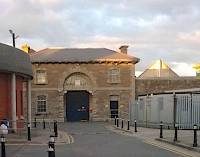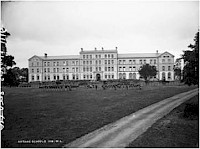Case Study 2: Imprisonment of Children in Ireland
Since it was established in 1956, St. Patrick’s Institution has been a byword for the failure of the State to properly care for children in the criminal justice system. While the reformatories and industrial schools for children had been closed down by the late 1970s, St. Patrick’s Institution - an adult prison - continued as a grim symbol of punitiveness towards children.
 Closure of St. Patrick’s Institution was recommended in the Whitaker Report in 1985, and the inhumane treatment of inmates was consistently highlighted by national and international bodies over the following three decades.
Closure of St. Patrick’s Institution was recommended in the Whitaker Report in 1985, and the inhumane treatment of inmates was consistently highlighted by national and international bodies over the following three decades.
[Image: St. Patrick's Institution.]
Since 1994, IPRT has played a central role in maintaining pressure on Government about the need to end the detention of children in the prison system. In all our work – in every statement, report, press release detailing the most serious issues in Ireland's prison system – we consistently hammered home two core issues that were a blot on Ireland’s human rights record:
- the ongoing imprisonment of children in Ireland, in breach of international human rights standards;
- and the lack of access by children so held to an independent complaints mechanism.
So what did we do about it?
 We did our research. We laid out the requirements of Ireland’s international obligations to children in detention, and bolstered our statement of these clear obligations with international evidence and best practice in dealing with children in conflict with the law. We set out our position that the detention of children in prison was among Ireland’s most serious human rights breaches, and must end.
We did our research. We laid out the requirements of Ireland’s international obligations to children in detention, and bolstered our statement of these clear obligations with international evidence and best practice in dealing with children in conflict with the law. We set out our position that the detention of children in prison was among Ireland’s most serious human rights breaches, and must end.
[Image: St. Joseph's Industrial School, Artane, which closed in 1969.]
And then we went about campaigning for real change. We made submissions. We published briefings and reports. We held seminars. We issued press releases. We talked to the media, and we talked to international monitoring bodies. We built alliances with the key stakeholders in the youth justice system and the wider children and youth sector. We fought myths and assumptions about crime committed by children and young people with facts and analysis. We focused on the scientific evidence around young people's capacity for change.
In everything we did, we insisted that prison is an entirely inappropriate place to hold children, and that all children in detention must have access to an independent complaints mechanism such as the Ombudsman for Children.
What was the result?
Following more than 25 years of commitments by successive governments but little action, on 2nd April 2012 the Minister for Children and Youth Affairs, Frances Fitzgerald, announced concrete plans to end the practice of detaining children in St Patrick’s Institution by 2014. The Government committed €50m for the building of six units over 3 years, creating 30 new spaces, at Oberstown, Lusk, Co Dublin, where the three existing children detention schools are located.
This development was welcomed by the Ombudsman for Children, the Irish Penal Reform Trust, Barnardos, the Children’s Rights Alliance, Fr. Peter McVerry and others who have long been campaigning for the immediate end to what has been a serious blot on Ireland’s human rights record.
International pressure came from the United Nations Committee on the Rights of the Child, the European Committee for the Prevention of Torture and Inhuman or Degrading Treatment or Punishment (CPT), the United Nations Committee against Torture, the European Committee on Social Rights, and by Council of Europe Commissioner for Human Rights.
As of 1st May 2012, all newly remanded or sentenced 16-year old boys are to be detained in the children detention facilities at Oberstown instead of St Patrick’s Institution. The last 16-year-old in St Patrick’s Institution was released at the end of July 2012.
On 23rd June 2012, the Minister for Children and Youth Affairs and the Minister for Justice and Equality removed the subsection from the Ombudsman for Children Act 2002 which excluded children detained in St Patrick’s Institution from the complaints remit of the Ombudsman for Children.
In October 2012, the Inspector of Prisons published a highly critical report about St. Patrick’s Institution, identifying serious problems at the prison including mistreatment and bullying of boys, excessive use of force, excessive use of punishment, and a completely deficient complaints system.
Following that report, the Minister for Justice announced his intention to close the prison completely for all persons under the age of 21.
The Children (Amendment) Act 2015 amalgamated the three detention centres in Oberstown to one campus, gave children in custody the same remission rights as adults, and paved the way for St. Patrick’s Institution to eventually close.
On 7th April 2017, St. Patrick’s Institution was officially closed by Minister for Justice and Equality Frances Fitzgerald, and the Prisons Act was amended to remove it from the statute book. All 17-year-olds committed from the 31st March 2017 were sent to Oberstown.
Where to next?
IPRT continues to campaign for a progressive and effective youth justice system, which prioritises prevention and early intervention strategies over punitive and ineffective responses to crime committed by young offenders. We also continue to monitor that commitments by Government, hard-won and all too fragile, are being met.
For more information on how you can support our work, please see here.
Key actions by IPRT
IPRT is one of a number of loud voices that have demanded of successive Governments to end the detention of children in St. Patrick’s Institution. Specific actions by IPRT in more recent years that contributed to the commitments in 2012 include:
- March 2006: IPRT Submission to the European Committee for the Prevention of Torture and Inhuman or Degrading Treatment or Punishment (CPT) in preparation for the 2006 CPT visit to Ireland emphasises Ireland’s failings regarding the ongoing detention of children within the adult prison system.
- March 2006: As part of the Irish Youth Justice Alliance, IPRT makes an oral submission to the Joint Oireachtas Committee on Justice, Equality and Women’s Rights, highlighting “the failure to make immediate provision for the closure of St Patrick’s Institution.”
- August 2007: IPRT publishes The Whitaker Committee Report 20 Years On: Lessons Learned or Lessons Forgotten? detailing the lack of progress in terms of Whitaker’s 1985 recommendations on St Patrick’s Institution, despite progress in other areas of youth justice.
- October 2007: IPRT Submission to the to the Council of Europe Commissioner for Human Rights in preparation for the Commissioner's 2007 Visit to Ireland again highlights the detention of children within the adult prison system, detailing our serious concerns about conditions and practices.
- June 2008: The Shadow Report to the Third Periodic Report of Ireland under the International Covenant on Civil and Political rights (IPRT/ICCL/FLAC) identifies series issues in the detention of young people, emphasising that St Patrick’s is “unsafe”, that children cannot make complaints to the Ombudsman for Children, and that there is no timescale for ending detention of children in the prison.
- June 2009: IPRT hosts a Prison Law seminar on the topic ‘Sentencing and Procedures in Youth Justice Cases’. Over 115 practitioners attend.
- Nov 2009: IPRT Research Report on Detention of Children: International Standards and Best Practice is published, outlining the application of international human rights standards to children detention in Ireland, and renewing our call for the immediate end to the detention of boys at St Patrick’s Institution.
- August 2010: IPRT publishes its Briefing on Detention of Children in St. Patrick’s Institution, developed with Maria Corbett, Children’s Rights Alliance and Tony O’Riordan SJ, and updated in Dec 2010, October 2011, May and July 2012. Among many issues, the document highlights: conditions, protection regimes which see children locked up in cells for up to 23-hours a day, and the culture of bullying which persists in the Institution.
- Sept 2010: As part of our ‘Shifting Focus’ project – encompassing research, position paper, and conference – in collaboration with Barnardos and IAYIC (now EPIC), IPRT puts forward the clear argument for investment in prevention and early intervention strategies instead of costly and ineffective penal expansion.
- Feb/March 2011: Before and after the general election, IPRT actively pushes reform of penal policy with particular emphasis on the urgent need to end the practice of detaining children in St Patrick’s Institution. IPRT welcomes that the new Programme for Government includes such a commitment.
- April/May 2011: IPRT was extremely active in advance of and during Ireland’s First Periodic Review under the UNCAT (United Nations Convention against Torture and Other Cruel, Inhuman or Degrading Treatment or Punishment) to bring pressure on the Government to act. In its Concluding Observations, the Committee made an urgent call on the Irish Government to proceed “without delay” with the construction of the new child detention facility at Lusk and to end the detention of children at St. Patrick’s Institution, and to extend the power of Ombudsman for Children to receive complaints from children in prison.
- Oct 2011: FollowingIPRT's intense advocacy work in advance of Ireland's first hearing under the Universal Periodic Review, recommendations are made by Member States to end the imprisonment of children in Ireland and to extend the complaints remit of the Ombudsman for Children.
- Nov 2011: IPRT co-hosts a briefing for the Oireachtas All-Party Penal Reform Group on the incarceration of children in St Patrick’s Institution, with presentations from Ombudsman for Children, Emily Logan, and Prof. Harry Kennedy of the Central Mental Hospital, who spoke on the negative impact of imprisonment on the mental health of adolescents.
- Jan 2012: RTÉ News feature, ‘The Gates to Nowhere’ (to which IPRT had contributed in concept, content and interviewees) highlights that proposals to end the imprisonment of children in St Patrick’s Institution have stalled. Intense media reaction extends over two weeks.
- April 2012: Minister for Children and Youth Affairs, Frances Fitzgerald, announces concrete plans to end the practice of detaining children in St Patrick’s Institution by 2014, including the commitment of €50m for the building at Oberstown, Lusk, Co Dublin.
- June 2012: Exclusion of children held in St. Patrick’s Institution from the complaints remit of the Ombudsman for Children is removed. In effect from 1st July, 2012, it applies retrospectively for 2 years.
- July 2012: Final 16-year old boy leaves St Patrick’s Institution; 17-year-old boys continue to be committed and detained there.
- October 2012: Minister for Justice announces his intention to close St Patrick’s Institution for all boys and young men aged under-21.
- 31 July 2013: There are nine 17-year-old boys in the Irish prison system - this is still nine too many, but is nonetheless a positive reduction in numbers.
- December 2014: IPRT launches report in conjunction with Children’s Rights Behind Bars that investigates how children are treated in the penal system in Ireland
- March 2015: Responsibility for all new 17-year-old committals is transferred to Oberstown from the prison system.
- July 2015: Children (Amendment) Act passed, which removes legislative obstacles to ending the detention of children in St Patrick’s Institution.
- April 2017: St. Patrick’s Institution closes, is removed from statute, and all children under 18 are henceforth committed to Oberstown.




